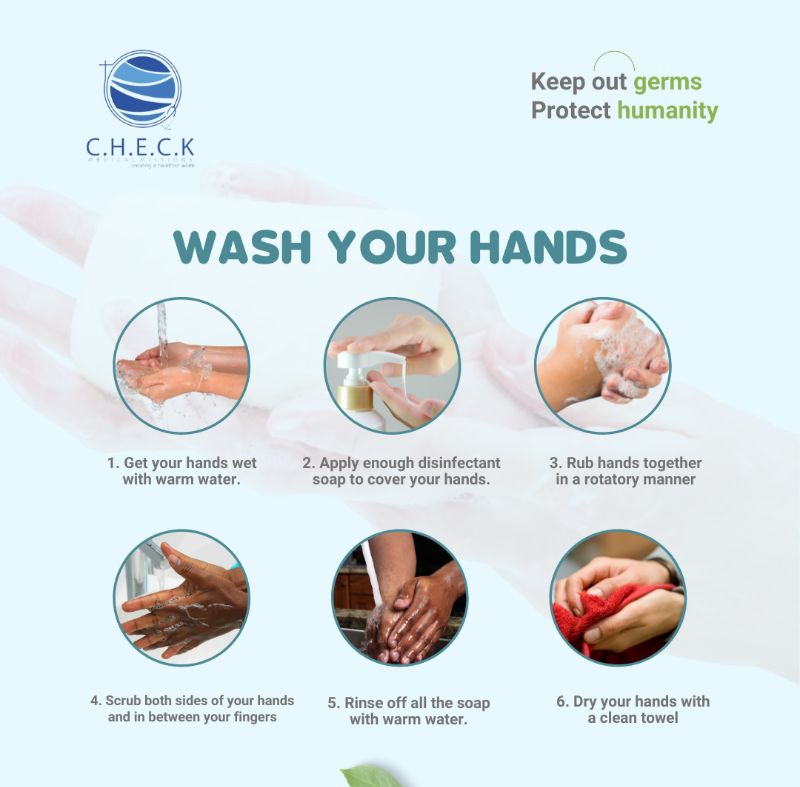Written by Nancy Akaneme
What Exactly is Hands washing
Hand washing, also known as hand hygiene, is the act of cleaning one’s hands with soap or handwash and water to remove microorganisms, dirt and grease, or other harmful and unwanted substances stuck to the hands.
“Hand Washing is the single most important means of preventing the spread of infection”
If soap and water are not available, use hand sanitizer. Wash your hands with soap and water when your hands are visibly soiled.
Food handlers in restaurants, schools, delis, and grocery stores must wash their hands with soap and water before applying hand sanitizers.
Ensure You Promote Hand Hygiene
Hand Hygiene can be taught through:
- Posters,
- brochures,
- manuals,
- curricula, and other hand hygiene materials that you can print and use.
Why Hand Hygiene is Important?
Washing your hands is the best way to stop germs from spreading. Learn more about why you should wash your hands, diseases you don’t want, antibiotic resistance, how germs are spread, where germs hide, and when to wash your hands below:
Why wash?:
- Handwashing/ Hand Hygiene Prevents disease transfer:
Do you know that a large number of diseases and conditions could be prevented by proper hand hygiene? Yes. Hence why we should promote hand washing.
- Hand Hygiene help curb Antibiotic Resistance:
Antibiotic resistance is a growing concern. Handwashing prevents the spread of germs.

Common Ways Germs are Spread
- after using the toilet
- after changing nappies
- before, during, and after food preparation
- between handling raw and uncooked or ready-to-eat food
- before eating with hands
- after coughing, blowing your nose or sneezing
- after making use of a tissue or a handkerchief
- before and after taking care of sick children or other family members
- after smoking
- after handling garbage/rubbish or working in the garden
- after handling animals
- when you get home, arrive at other people’s homes, at venues, or at work.
Pls Note:
Avoid touching your eyes, nose, and mouth with unwashed hands.
If you feel a cough or sneeze is coming on, make sure to cough or sneeze into a tissue and then throw it away and wash your hands.
If you do not have a tissue, cough or sneeze into your elbow. It’s a part of your body less likely to touch other surfaces and will help stop the spread of nasty germs.
How to wash your hands properly
To wash hands properly, follow the following steps:
- Wet your hands with clean, running water, and turn off the tap.
- Apply soap and lather well for 20 seconds (or longer if the dirt is ingrained).
- Rub hands together rapidly across all surfaces of your hands and wrists.
- Don’t forget the backs of your hands, your wrists, between your fingers, and under your fingernails.
- If possible, remove rings and watches before you wash your hands, or ensure you move the rings to wash under them, as microorganisms can exist.
- Rinse well under running water and make sure all traces of soap are removed.
- Dry your hands using a clean towel or air dry them.
- It is best to use paper towels (or single-use cloth towels).
- Dry under any rings, as they can be a source of future contamination if they remain moist.
- Hot air driers can be used.

At home, give each family member their towel and wash the towels often
What Happens When You Don’t Wash Your Hands
- You Pass on Germs!
If you don’t wash your hands when they’re germy, you could pass those germs to friends and family and get them sick. If you get them on an object — like a doorknob or handrail — you could infect people you don’t even know. Make sure to lather up after you use the bathroom. A single gram of human faeces can contain billions of germs. Besides, those germs can get to you, too. Your hands can carry germs into your eyes and your mouth from places you don’t even want to think about. And the illnesses the germs can cause could be serious. Washing your hands with soap (which is much more effective than sanitizer or water alone) can protect you from illnesses like diarrhea, respiratory infections, and more.
- Children Miss a Lot of School!
Kids can get sick from the germs they don’t scrub away, which causes them to miss school activities. Handwashing education in schools can reduce gastrointestinal problems children come down with.
- You Miss a Lot of Work!
Falling sick means you take a lot sick days and undone work. One of the ways you can avoid getting the common flu is to ensure hand hygiene!.
Editorial board:
Chibuike Chukwudike (Manager)
Emmanuel Oluwaseun
Oluwasemiye Owolabi



